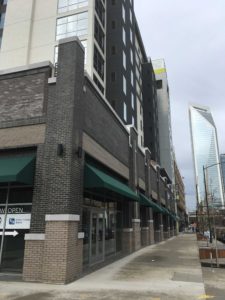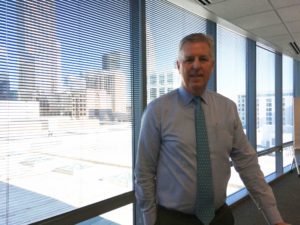Two Charlotte Political Conventions, Then And Now

On today’s episode of Inside Politics, we’re going to do some compare-and-contrast between 2012, the last time Charlotte hosted a convention, and now as we’re preparing for the RNC.
The first place we’re going to visit is the corner of Stonewall and Caldwell streets uptown. This is the site of a new mixed-use development that includes hundreds of apartments, a hotel and a new Whole Foods.
But eight years ago, this was an empty field – and the site of the city of Charlotte’s much-maligned Free Speech Zone, or Speaker’s Platform. The Democratic National Committee had required past host cities to have a designated area for people to speak about whatever they wanted to. They were known as Free Speech Zones.
Free Speech
At the 2004 DNC in Boston, the speech zone was surrounded by a fence, and people called it the “Freedom Cage.” Former Charlotte City Attorney Bon Hagemann wasn’t a fan of the idea.
“I recall a citizen speaking to the City Council and making the point or asking the question, ‘I thought the entire city was a Free Speech Zone,’ ” Hagemann said. “And that kind of resonated with us, and it changed our thinking.”
Hagemann didn’t want to have a designated free-speech area. Part of that was because he didn’t think anyone would use it – and also because the city’s position was that people could exercise their First Amendment rights anywhere in the city, at least outside of the Secret Service security zone.
So Charlotte did some rebranding and changed the name of the Free Speech Zone to the Speaker’s Platform.
Leading up to the 2012 DNC, the Occupy Movement – which protested social and economic inequality – was in full force in New York City.
And in Charlotte, the Occupy Movement had been camped out on the grounds of the Old City Hall on Trade Street for four months. With the DNC approaching, the City Council passed a new ordinance prohibiting camping on city property, and Charlotte police removed the campers in January 2012 – eight months before the convention.
As they were being removed, protesters shouted “Occupy will never die! Evict us, we’ll multiply!”
For the DNC, Charlotte was expecting remnants of the Occupy Movement, as well as other left-wing protestors. On the night before the convention began, about 50 Occupy members set up tents in Marshall Park. The city decided to let them stay.
And for the speaker’s platform, Charlotte set up a microphone and a platform in the empty field at Caldwell and Stonewall.
“My recollection is that while a lot of people signed up, not many people showed up,” Hagemann said.
In the end, only two or three people used the platform. The protesters decided to take their message elsewhere.
At one point, they shut down Caldwell and Stonewall for a brief period. They chanted: “Whose streets? Our streets!”

Hagemann, who was the attorney when the RNC contract was being negotiated, said the city asked the Republican National Committee not to have a Speaker’s Platform for 2020.
But John Lassiter, a former City Council member who is leading the local host committee for the RNC, said there will be another designated spot for speeches. But he doesn’t know where it will be yet — and whether anyone will use it.
In recent conventions, host cities have been worried about violent protests, but they haven’t materialized. That’s likely due to the massive security and police presence, funded by a $50 million grant.
The security zone hasn’t been announced for the convention, but Lassiter said he expects it to the larger than it was for the DNC in 2012. The zone that year was relatively small, and only extended a couple of blocks past the Spectrum Center and the Convention Center.
There is another question about the 2020 RNC: Will the city give police more leeway to search people in uptown around the convention?
Eight years ago, the City Council passed the controversial Extraordinary Events Ordinance, which gave police more leeway to search backpacks in a designated area, and it also prohibited people from carrying things like knives, chains and gas masks. The ordinance also prohibited people from covering their faces.
That ordinance stayed on the books after the DNC and it was used for other events, like the Pride Parade and the Fourth of July Fireworks. City Council repealed it in 2017.
Patrick Baker, the current city attorney, said the city might bring back the ordinance for the RNC, or some variation of it. He said a decision is a few months away.
One footnote: One of the recent most high-profile marches was the January pro-Second Amendment rally in Richmond, Virginia, in which thousands marched with their guns.
In North Carolina, state law allows people to openly carry their weapons – and no city ordinance can preempt that. However, state law also prohibits people from openly carrying weapons during a parade or demonstration, which means that a Richmond-style gun rally is prohibited here.
Money
Across the street from the Whole Foods in uptown Charlotte is the NASCAR Plaza.
And on the seventh floor, with sweeping views of Charlotte’s skyline, is the headquarters of the Host Committee for the 2020 Republican National Convention.
And leading the committee is Lassiter, who narrowly lost the 2009 mayor’s race to Anthony Foxx. Foxx, of course, was essentially Charlotte’s face for the 2012 DNC.
For the next 200 days, Lassiter’s focus is raising a little more than $70 million. That pays the convention’s bills – things like renting the Spectrum Center, building the huge stage, paying for transportation, and so on.
In a way, Lassiter has a template on how to do this: The 2012 DNC.
But he’s quick to point out it’s not a good one.
“You gotta remember, in 2012, they defaulted on a $10 million credit,” Lassiter said. “So that’s always in the back of our mind about paying our bills and carrying out our responsibilities.”
Lassiter is referring to a $10 million line of credit from Duke Energy. The host committee tapped $8 million of that, which it wasn’t able to pay back. Duke shareholders ended up covering $6 million of that.

And the reason that the host committee in 2012 had so much trouble is that the Democratic National Committee prohibited it from accepting money from PACs and federal lobbyists. Individual donations were capped at $100,000.
Steve Kerrigan, who was the national Democrat’s point person in Charlotte, said the restrictions made fundraising harder than anticipated.
“Now, look: $100,000 is a check that unless I’m buying a house, I’m never writing,” he said. “But it kept people from writing, you know, one and two and three and $10 million personal checks to try to keep everything a little bit more grassrootsy, if you will, and make sure it’s about individuals and not of a corporation.”
The change was significant because corporations usually bankroll national political conventions. For instance, for the 2016 conventions, the group opensecrets.org found that AT&T gave the Republicans $4.3 million in in-kind donations and $1.5 million to the Democrats. Microsoft, Facebook, Google and Xerox were also big donors to both conventions.
Kerrigan said Charlotte knew what it was getting into when it agreed to host the convention, and that the fundraising limits were in the contract.
Foxx, who was the mayor during the DNC, said he spent a huge part of 2012 flying around the country, courting donors.
“I was definitely involved in raising money,” Foxx said. “I had to be. Because for me it was an issue of making sure the city looked as good as it possibly could look. I spent a lot of time – I think I may have racked up 100,000 miles that year.”
In the lead-up to the convention, the host committee was asked by the media about fundraising. And the group was always very optimistic – or misleading – saying that they were “right on track.”
The host committee ended up raising $24 million, $13 million short of the goal.
And it should be noted that the host committee had a separate non-profit that paid for ancillary events like a street festival that was meant to promote the city. That group did accept corporate money, and it also paid for the rental fee for the arena, which is an essential convention cost.
Charlotte surgeon Dan Murrey, who lead the host committee eight years ago, said he doesn’t think the restrictions mattered to voters.
“No one has done it before, since, I doubt anyone will ever try it again,” he said. “I think the hope and the thought was that if we took corporate money out of the center of the convention that it would be more grassroots, of the people. I’m not sure that messaging had much of an impact from a political standpoint.”
For 2020, Lassiter expects corporate money will make up much of the contributions.
“We’re making great progress,” he said. “We’re on track to raise more money in the budget than we had for ’18 and ’19 but a lot of the money comes in later, so we have to work to get our cash in.”
While Lassiter is saying the fundraising is essentially right on track – or even ahead of that – there are reasons to suggest he is right.
There are no limits on corporate donations. And Trump’s reelection campaign raised more than $300 million last year, which Politico says is the most a sitting president has ever raised in the year before an election.
Politico also reported that Trump has twice as much cash on hand – $158 million – as Obama did at this point before his reelection.
Hotels
To put on a convention, of course, you need money. But you also need hotel rooms.
To start this discussion, we’re going to take you to WFAE’s studios in the University area.
Kerrigan said that former vice president Joe Biden stayed at the University Hilton, which is about 100 yards from WFAE’s studios. He said Biden wanted to stay with the Delaware delegation, so he was a little off the beaten path.
Eight years ago, there were only 4,400 hotel rooms in uptown Charlotte. Today there are 5,600, with more than 1,200 under construction. So for 2020, more people are going to be able to stay in uptown and in surrounding areas.
Eight years ago, some thought that President Barack Obama would stay at what’s arguably the city’s nicest hotel, the Ritz-Carlton on Trade, next to the Spectrum Center.

But Kerrigan said when you book a hotel for the president, it’s not just a handful of rooms, it’s more 100 rooms to accommodate staff and security.
“And so if you put them in the Ritz, anyone who’d ever been a donor to the host committee or to anybody else would not get a room at the Ritz,” he said. “Plus, you would shut down traffic in uptown Charlotte anytime you moved anywhere. And so it made total sense to put him out in Ballantyne.”
Obama stayed at The Ballantyne resort, which is relatively secluded and had plenty of room for White House staff and security.
And when giving big donors close to the convention is critical for the parties.
Politico reports that a $300,000 donation to this year’s DNC in Milwaukee gives you two nearby hotel rooms.
Lassiter noted that the president doesn’t have to spend the night in Charlotte. Trump often likes to stay at his own properties, and he can’t do that in Charlotte.
Trump owns a golf course in Mooresville, but there’s no hotel there. In theory, he could sleep at Mar-a-Lago and fly to Charlotte on the day he gives his acceptance speech.
With as many as 50,000 people coming to the city, it’s still unclear who will officially welcome them.
Mayor Vi Lyles, a Democrat, said in 2018 she wasn’t going to speak at the convention.
Lassiter is trying to change her mind.
“I have indicated to her that I think it would be appropriate for her to welcome people to her city,” he said. “I have not pressed that issue to her in a while. I’m hoping she sees the value (in speaking).”
The mayor’s press manager said last week that, as of now, Lyles is not speaking.
Click here to subscribe to the Inside Politics podcast (and to give the podcast a rating/review in your favorite podcast app).
Want more? You can sign up here for our weekly Inside Politics newsletter, written by Steve Harrison.
Have a question about the 2020 RNC in Charlotte? Ask us below.